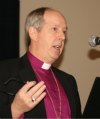A leading Church of Ireland bishop has said that religious freedoms should not be relegated below other rights. 
The Bishop of Raphoe and Derry, the Right Reverend Ken Good (pictured) warned that as values of pluralism and the promotion of equality and diversity are “considered to be paramount”, religion can be reduced to simply a personal matter.
Speaking at the Church of Ireland Synod, he said: “In the process it can happen that religious freedoms and religious rights can be trumped by other freedoms and rights that appear to merit a higher priority”.
But Bishop Good commented: “Religious freedom has long been recognised as one of the most basic and important rights, and it cannot be automatically overridden when it clashes with other rights.”
He also said: “It will take some time for us to get the weighting between religious and other rights more wisely and more finely balanced.
“During this process, it is likely that the case for religious freedom and rights will need to be argued with considerable effectiveness.”
His remarks come just weeks after he chaired an Iona Institute conference on the topic of religious freedom.
The conference, dealt with the rise of of ‘aggressive secularism ‘and the growing legal threat to religious freedom in Ireland and other Western countries. It was chaired by the Church of Ireland bishop of Derry and Raphoe, the Rt Rev Ken Good.
A packed house of almost 200 heard that the increasing drive to make equality the overriding legal value in the West was eroding religious freedom.
The conference was prompted by statements by politicians that religion shouldn’t be allowed to “cloud” their judgement” or that the Church should not be allowed to “intrude” on “matters of State”, and the threat of the INTO and other organisations to the right of denominational schools to employ staff who will respect their ethos.
In his talk, Professor Roger Trigg of Oxford University, called on governments to respect freedom of conscience in the face of new ‘equality’ laws.
Professor Trigg spoke about the philosophy behind threats to religious freedom in the UK and criticised Irish politicians, including Dermot Ahern and John Gormley, for ignoring calls to respect the principle of conscientious objection in the new Civil Partnership Act.
He said that ‘equality’ cannot be allowed to trump freedom of conscience and religion every time these rights clash, and that when they do clash, “the solution is not for one to override the other but for ‘reasonable accommodation’ of both”.
In his talk, Barrister Neil Addison told the conference that in Britain and elsewhere, the attitude was taking hold that religion must not in any way be given expression in public or working life.
He said that equality laws and anti-harassment laws were being used with increasing regularity against religious believers in the UK.
He instanced the case of the airport employee who was forbidden to wear a cross to work, the civil registrar sacked because she did not want to officiate at same-sex civil partnership ceremonies, the forced closure of Catholic adoption agencies that oppose adoption by same-sex couples, and the recent ruling by a UK court that a Jewish school is ‘racist’ after it defined who is and who is not a Jew for purposes of its admissions policy.
Turning to Irish examples, Iona Institute director, David Quinn, said that Section 37 of the Employment Equality Act, which allow religious organisations to employ staff who will respect their ethos, is under pressure from the INTO.
He described this protection as “vital to the identity of faith-based schools and other religious organizations”, and that the attempt to repeal this section amounted to a “strong attack on religious freedom”.
He cited the failure of the Government to protect freedom of conscience and religion in the Civil Partnership Act. He said that the failure to do so meant the Government “now equates belief in traditional marriage with racist bigotry.”
He said the recent action taken by the Fitness to Practice Committee of the Irish Medical Council against Dr Phil Boyle of Galway Clinic (see note two below) was “another example of how belief in traditional marriage is now seen as a form of prejudice rather than as something rational and defensible.”
Mr Quinn said that placing ‘equality’ above all other rights represented a new ‘moral absolutism’, and that the Government was violating Church/State separation by imposing this new absolute on religious believers and religious organisations.















